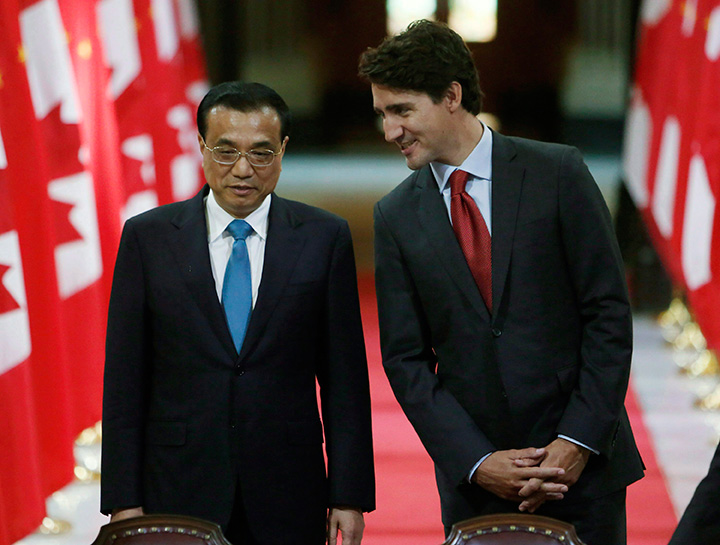The $75-million commitment proposed in the federal budget to boost trade and diplomacy with China is a sign that the government is pushing ahead on plans to negotiate a free trade agreement with the regime, says one former Canadian ambassador.

In the budget released on Tuesday, the government said it planned to provide up to $75 million over five years, starting this year to Global Affairs Canada to “establish a stronger Canadian diplomatic and trade support presence in China and Asia.”
READ MORE: Budget 2018: Some (lesser-known) highlights, from Pharmacare to service dogs
After those first five years, the government plans to spend $11.8 million per year on the effort.
The funds would go to getting more Canadian diplomats and trade commissioners on the ground in China, as well as a series of unspecified initiatives to “promote Canada’s trade with China and other Asian markets.”
An announcement of formal discussions toward a free trade agreement was widely expected to be announced in December during a visit by Prime Minister Justin Trudeau to China. Yet the Canadian contingent left without making such announcement, leaving many to wonder what might have rocked the boat.
WATCH BELOW: Trudeau puts pressure on China amid talks of unprecedented trade deal

Scuffles broke out between Canadian and Chinese officials during the trip, including an incident in which Chinese security guards physically blocked media from taking photos of Trudeau and Chinese Premier Li Keqiang.

Get daily National news
According to former Canadian ambassador to China Guy Saint-Jacques the reason for the lack of an announcement was Canada’s insistence that a joint statement include a specific reference to labour rights.
READ MORE: Justin Trudeau leaves China without securing commitment to trade talks
Saint-Jacques also said the $75 million program shows the federal government recognizes that staff already on the ground in China will be hard-pressed to keep up with the increased demands and workload that would come with the full-fledged free trade negotiations.
Saint-Jacques, who served as Canadian ambassador to China for five years ending in 2016, said both Canada and China have already agreed to proceed with formal negotiations and that part of the money announced in the budget will go to supporting that.
“If we proceed, obviously there is a need to reinforce the capacity to manage these negotiations,” Saint-Jacques said.
- Canadians involved in tourist bus crash in Dominican Republic, embassy says
- ‘Don’t rely’ on Ottawa for help fleeing Iran war, feds tell Canadians
- Alberta mulls ditching time switch — again — as B.C. moves to permanent daylight
- Canadians stuck in Middle East say cities ‘very tense’ as Iran conflict escalates
“At the embassy, in the trade section, you have a trade policy section that would need to be reinforced. Because when you have detailed negotiations, obviously there is a need for regular updates and all this. I assume that the money that is earmarked, part of that will be devoted to that.”
COMMENTARY: Why Trudeau should take a pass on free trade with China
Budget 2018 did not detail exactly how the $75 million will be spent in terms of how many trade and diplomatic staff will be posted to China or whether the government will look at opening more regional trade offices on top of the 10 currently open in the country without a Canadian embassy or consulate general.
Opening a fifth consulate general would be a much more complex endeavor, given that the number of such consulates in both Canada and China must be reciprocal, as is laid out in the terms of the bilateral agreement between both countries.
WATCH BELOW: Too much appeasement to China ahead of possible trade negotiations: Scheer

Saint-Jacques said he expects some of the new resources will also go to increase staffing in the political section of the Canadian embassy in Beijing to keep up not only with free trade talks but also with the growing number of provincial and municipal leaders in Canada who go to China for their own meetings.
Part of the money could also go to opening new visa offices in China, he said, given both Trudeau and Li pledged to work to double the number of tourists between Canada and China during their meeting last year.
“At some point, it’s difficult to cover everything as you should, so that’s why in fact when I was the ambassador – I left almost a year and a half ago – I had pointed out to Ottawa that we were hard pressed in many sectors to respond,” Saint-Jacques sid.
“Seventy-five million sounds like a lot of money but in fact there is so much to do that in fact the government will have to be very strategic in allocating this money.”
On average, each Canadian foreign service officer deployed to work in China costs the government about $400,000 a year once their salary, allowances, housing stipends and health benefits are factored in, according to Saint-Jacques.
“All this to say, the money will be used very quickly.”








Comments
Want to discuss? Please read our Commenting Policy first.